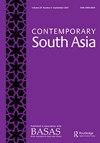Playing it the nation’s way: tradition, cosmopolitanism, and the native-masculine of Hindi sports films
IF 0.8
3区 社会学
Q3 AREA STUDIES
引用次数: 0
Abstract
ABSTRACT The generic popularity of Hindi sports films has been overwhelming in recent years. The article examines this genre of Hindi films through the thematic construction of the sports‘man’ and its evolutionary manifestation from a masculine figure symbolising India’s national unitarian ethos to a megalithic, tradition-backed, orthodox patriarchy post-2010s. It elaborates this seemingly linear transformation through decade based phases, starting from the social-emancipatory athletic phenomenon of the pre-globalisation era to the neoliberal Hindi sports films of the early millennial phase. The study then explores the slow dissolution of the ‘composite masculinity’ that considered the ethnic variegation of Indian nationalism, and the emergence of sporting cinema on patriarchal and athletic superheroes. The article further discusses how it was nurtured within deeply insular, and ethno-religious gaming traditions of antiquity like the akhara wrestling, in fictional/biographical sports films like Sultan (Zafar 2016) and Dangal (Tiwari 2016). While commenting on this transformation of the ‘national athlete’ into the ‘heritage’s surrogate’, the article attempts to provide a detailed methodology of understanding the expanding canon of Hindi sports films so far and how it aligns itself with the re-ethnicisation of India’s polity in the last two decades.按照国家的方式播放:传统、世界主义和印地语体育电影中的本土男性
本文章由计算机程序翻译,如有差异,请以英文原文为准。
求助全文
约1分钟内获得全文
求助全文
来源期刊

Contemporary South Asia
AREA STUDIES-
CiteScore
2.10
自引率
0.00%
发文量
82
期刊介绍:
The countries of South Asia - Bangladesh, Bhutan, India, Maldives, Nepal, Pakistan and Sri Lanka - are internally diverse and part of global flows of people, goods and ideas. Contemporary South Asia seeks to address the issues of the region by presenting research and analysis which is both cross-regional and multi-disciplinary. The journal encourages the development of new perspectives on the study of South Asia from across the arts and social sciences disciplines. We also welcome contributions to pan-regional and inter-disciplinary analysis. Our aim is to create a vibrant research space to explore the multidimensional issues of concern to scholars working on South Asia and South Asian diasporas in the postcolonial era.
 求助内容:
求助内容: 应助结果提醒方式:
应助结果提醒方式:


